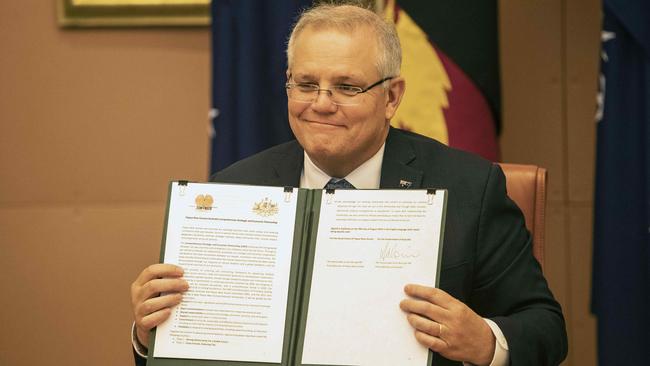Aussie businesses need to help check China in the Pacific

Westpac’s decision was a commercial one, based on a detailed assessment of the profitability of its Pacific operations and future growth prospects. It followed a decision some years ago by the bank to end its operations in smaller island nations, and the decision by the ANZ Bank to sell its retail operations in PNG.
The Australian government will be relieved that Westpac has sold its operations in both countries to Kina Bank, which is PNG based and listed on the Australian Securities Exchange. There were fears that one of the large China banks would acquire the Westpac assets.
But the departure of Westpac and the scaling back of ANZ leave a gaping hole in Australia’s presence in the region at a critical time. It’s not uncommon for these large banks to give support and advice to not only their customers, but governments as well. Because of their size and dealings with all businesses across the region the Australian banks will be missed in supporting local economies.
If Australia is to have any chance of countering the growing Chinese presence and influence in the Pacific, it’s going to need the support and involvement of Australian business. Key sectors here would include resources, technology, education and training, health, agriculture, finance and insurance.
While the two banks operating nationwide in PNG — Bank of South Pacific and Kina Bank — are profitable and highly regarded, competition in the banking sector has been substantially reduced. The same has occurred in Fiji and the smaller island nations.
In the meantime, China state-owned entities are growing their presence through finance company structured operations, lending to PNG business and individuals. The most active is Moni Plus which has multiplied its presence over the past couple of years. It’s probably only a matter of time before a major China bank seeks to enter the retail market in PNG and the wider Pacific.
The reduced competition resulting from the effective withdrawal of Westpac and the retail operations of ANZ will make it difficult for the Bank of Papua New Guinea, which regulates the banking and finance sectors, to deny approval of a new entrant that increases competition.
The challenge the Australian government faces as it seeks to expand its Pacific step-up program is to encourage greater Australian business and investment in an environment in which there’s almost no Australian banking and finance presence.
Taxpayer-funded projects alone won’t counter the growing China influence in construction, communications, education, fisheries, agriculture and in meeting the region’s growing infrastructure needs.
The island states need the support and direct involvement of the business sector forming partnerships and joint ventures with the region’s own business sector and individual entrepreneurs.
China’s Pacific presence continues to grow despite any short-term setback negative responses to the COVID-19 pandemic may have created. Even Pacific companies with a long history of success are finding the China challenge just too daunting in key areas such as construction and infrastructure.
When it comes to airport maintenance, port development, and road construction and maintenance, just about all the PNG and aid agency-funded contracts have gone to Chinese state-owned companies. China’s construction sector is winning the lion’s share of Asian Development Bank-funded infrastructure projects in the country.
If Australia wishes to make a real impact through our Pacific step-up we need to find ways to give the Australian private sector the confidence, and if need be financial support, to make an impact in our neighbourhood.
This should be done in a way that China companies won’t; by forming partnerships, joint ventures, and other mutually satisfactory arrangements, with existing and potential island owned and operated enterprises.
The Morrison government has taken a hands-off position on the ending of a substantial Australian banking presence in the Pacific. But other Australian businesses should be forming partnerships with Pacific governments and the private sector.
That’s the way to start making a real difference.
Anthony Bergin is a senior fellow at the Australian Strategic Policy Institute. Jeffrey Wall has had a four-decade association with PNG, including as an adviser to several prime ministers







The decision late last year by Westpac to sell its extensive bank operations in Papua New Guinea and Fiji makes the challenge the Morrison government faces in trying to counter the growth of China’s influence in the region more daunting.